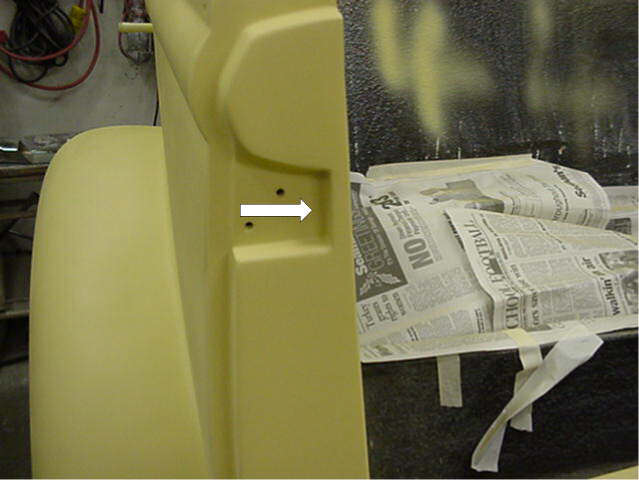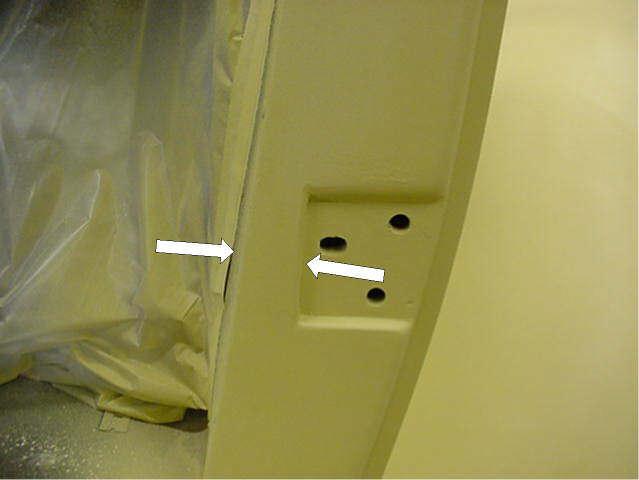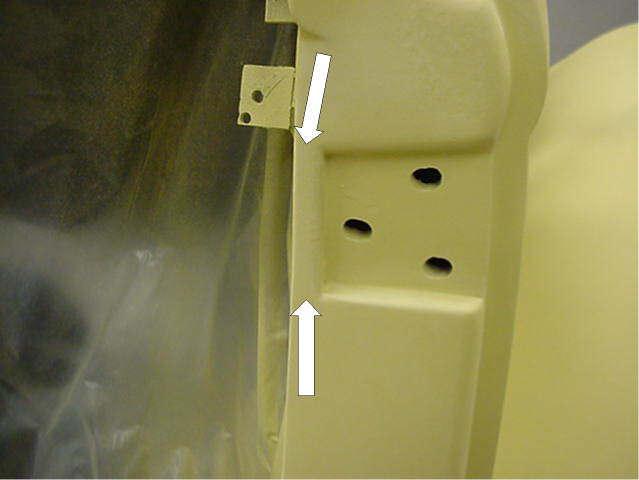Hinge indentations given a nicer
finish

Fred filled in the space behind the striker plate on the
door post for a more finished look
and less draft seeping in
|

Fred also filled in the space behind the hinges on the
front door posts. Lower shown here,
and upper shown in the picture below.
|

The indented areas for the hinges no longer go all the
way through to the inside of the car.
|

PICTURE SHOWS HOW I MOLDED A GENTLE ROUND CURVE ON THE
EDGE OF THE BODY RIGHT OVER THE DASH BOARD. IT HAD
AN UNFINISHED LOOK ABOUT IT BEFORE. I USED WOOD AS
A MOLD AND USED A FIBERGLASS REINFORCED BODY FILLER.
WOOD IS REMOVED AND SHAPING WAS DONE WITH
SANDPAPER. YOU GET TO FEEL LIKE A SCULPTOR WORKING
WITH THESE MATERIALS.
|
Fuel
sending unit adapter

I NEEDED NEW GAGES FOR CAR 144 AND PURCHASED A SET OF
STEWART WARNER. IT'S NICE TO GET A SPEEDOMETER THAT
GOES UP TO 120 MILES HOUR AS I DID HEAR THAT THE
INTERNATIONAL 4 CYCLINDER IS VERY
POWERFUL. 
THE FUEL GAGE SENDER UNIT CAME WITH THE
SET. I NEEDED TO MAKE AN ADAPTER TO INSTALL IT
SINCE THE MOUNTING FLANGES WERE DIFFERENT. THE
PICTURE EXPLAINS IT VERY WELL.
|
Blue coat primer

SHOWS A LITTLE BLUE MIST COAT WHICH IS USED FOR A GUIDE
FOR WET SANDING. WHEN YOU WET SAND THAT OFF YOU'VE
GOT THE SURFACE FLAT AND SMOOTH.
ALSO NOTE THE FUEL GAUGE HOLE I CUT.
|
|
Top frame modified at car front 
A hand-build oak piece for top frame above the windshield
to help with draft control and to add a more gentle
rounded edge to the top in front.
|
|
Door sill plate made from oak

A threshold plate out of a piece of oak I have been
saving for the last 3 or 4 years or more. I should
say a "second hand" piece of oak because it
wasn't new ... recycled.
Note -View: Looking down -- running board strips can be
seen along the bottom of the picture.
|
|
Homemade radiator overflow tube / relocated filler
tube 
Pressurized cooling systems today have an overflow
bottle. I set out to put one on car 144 and
looked at every bottle in every car in the junk
yard and nothing looked like I could adapt it to under
the hood. In the street rod magazines they
advertise stainless steel ones for between $47.00 to over
$50.00. So I went into the inventory of my
own collection of junk and found I had some stainless
steel swimming pool railings and some copper tubing and
the neck and cap from an old radiator... and wu laa....
an overflow bottle is now installed.
Notice how the bend in the railing kind of fits the
contour of the grill shell.
|
|

Radiator filler was relocated. The neck came off some
Japanese car that the radiator shop happen to have.
I moved it because it was under the grill shell and
very awkward to fill it from there.
|
|
Brace to lift and tighten the top 
. A little device to stop the rattles in the top
mechanism. Some of the pictures Don took of the top
had a wire tie wrapped around the parts that rattle. I
noticed this on one of the Glassics I have seen in
person, so I made these little devices. Tried it
out today. It's not 100 percent but we will see
what its like when we get the top.
Note from the Annexmaster, 4/2008: My 1978 had
a droopy top and I made C - shaped loops out of heavy rod
and placed them
over the side
brackets. Pushing up on the top moved the
pieces closer together and
the clamp could be slid to the left, in this case, using tension to keep
the pieces closer together.
|
|

Just when we were ready to praise Fred for his infinite
patience, we see that he IS human after all. He
temporarily slapped his parts together for a little
mid-winter test run.
|
| More coming. |











